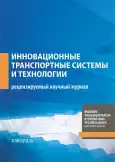Математический эксперимент в логистических исследованиях мультимодальных грузоперевозок с временными и стоимостными показателями
- Авторы: Богачев В.А.1, Кравец А.С.1, Богачев Т.В.2
-
Учреждения:
- Ростовский государственный университет путей сообщения
- Ростовский государственный экономический университет
- Выпуск: Том 9, № 1 (2023)
- Страницы: 108-121
- Раздел: Оригинальные статьи
- URL: https://bakhtiniada.ru/transj/article/view/126663
- DOI: https://doi.org/10.17816/transsyst202391108-121
- ID: 126663
Цитировать
Полный текст
Аннотация
Цель: Разработка нового подхода к оптимизации процесса распределения грузопотоков на транспортном полигоне. Построение математической модели процесса грузоперевозок, учитывающей в равной степени интересы различных участников перевозочного процесса.
Материалы и методы: Строится математическая модель процесса грузоперевозок, которая опирается на инфраструктурные показатели рассматриваемой части железнодорожного полигона и представляет собой многокритериальную оптимизационную задачу целочисленного программирования. Алгоритм решения задачи является общим для наземного транспорта и реализован в среде системы компьютерной алгебры. В качестве проекта, представляющего собой пример приложения разработанного транспортно-логистического метода, рассматривается часть Северо-Кавказской железной дороги, примыкающая к основным грузовым портам Азово-Черноморского бассейна. Рассматриваемый железнодорожный полигон является транзитной составляющей, активно эксплуатируемой при российском экспорте, в частности, зерновых грузов.
Результаты: Изучаются вопросы организации железнодорожных грузоперевозок в мультимодальных транспортно-технологических системах на основе эгалитарного и утилитарного подходов в теории благосостояния. Указанные подходы рассматриваются в отношении участников перевозочного процесса (агентов) в рамках временных и стоимостного показателей этого процесса. Вычислительные процедуры нахождения оптимальных распределений грузопотоков доведены до конкретных результатов.
Заключение: Математический эксперимент, используемый как инструмент имитационного моделирования, позволяет разносторонне и целенаправленно манипулировать показателями перевозочного процесса и ограничениями, накладываемыми на планы перевозок. Полученные в результате оптимизации по Парето распределения грузопотоков в адрес припортовых станций выгрузки, анализируются с точки зрения их рациональности и полезности в отношении агентов.
Полный текст
Открыть статью на сайте журналаОб авторах
Виктор Алексеевич Богачев
Ростовский государственный университет путей сообщения
Email: bogachev-va@yandex.ru
ORCID iD: 0000-0003-1202-7318
SPIN-код: 2125-5198
к.ф.-м.н. доцент
Россия, Ростов-на-ДонуАлександра Сергеевна Кравец
Ростовский государственный университет путей сообщения
Email: kravec_as@mail.ru
ORCID iD: 0000-0001-7371-7158
SPIN-код: 9591-3729
к.т.н.
Россия, Ростов-на-ДонуТарас Викторович Богачев
Ростовский государственный экономический университет
Автор, ответственный за переписку.
Email: bogachev73@yandex.ru
ORCID iD: 0000-0001-9641-0116
SPIN-код: 2262-0080
к.ф.-м.н., доцент
Россия, Ростов-на-ДонуСписок литературы
- Aulin V, Lyashuk O, Pavlenko O, et al. Realization of the Logistic Approach in the International Cargo Delivery System. Communications - Scientific letters of the University of Zilina. 2019;21(2):3-12. doi: 10.26552/com.C.2019.2.3-12
- Krajcovic M, Grznar P, Fusko M, et al. Intelligent Logistics for Intelligent Production Systems. Communications - Scientific Letters of the University of Zilina. 2018;20(4):16–23. doi: 10.26552/com.C.2018.4.16-23
- Shramenko NY, Shramenko VO. Mathematical model of the logistics chain for the delivery of bulk cargo by rail transport. Scientific Bulletin of National Mining University. 2018;5(167):136¬–141. doi: 10.29202/nvngu/2018-5/15
- Prachi A, Talari G. Multi-choice stochastic transportation problem involving logistic distribution. Advances and Applications in Mathematical Sciences. 2018;18(1):45-58. Доступно по: https://www.proquest.com/docview/2195081117 Ссылка активна на: 08.03.2023.
- Pronello C, Camusso C and Valentina R. Last mile freight distribution and transport operators’ needs: which targets and challenges? Transportation Research Procedia. 2017;25(0):888-899. doi: 10.1016/j.trpro.2017.05.464
- Elbert R, Müller JP, Rentschler J. Tactical network planning and design in multimodal transportation – A systematic literature review. Research in Transportation Business & Management, 2020;35:100462. doi: 10.1016/j.rtbm.2020.100462
- Kopytov E, Abramov D. Multiple-criteria analysis and choice of transportation alternatives in multimodal freight transport system. Transport and Telecommunication Journal. 2012;13(2):148-158.doi: 10.2478/v10244-012-0012-x
- Yannis G, Kopsacheili A, Dragomanovits A, et al. State-of-the-art review on multi-criteria decision-making in the transport sector. Journal of Traffic and Transportation Engineering. 2020;7:413–431. doi: 10.1016/j.jtte.2020.05.005
- Kabashkin I. Heuristic Based Decision Support System for Choice of Alternative Routes in the Large-Scale Transportation Transit System on the Base of Petri Net Model. Procedia Engineering. 2016;134:359-364. doi: 10.1016/j.proeng.2016.01.020
- Чеченова Л.М. Обоснование решений в области цифровизации контейнерных сервисов Октябрьской железной дороги // Инновационные транспортные системы и технологии. – 2022. – Т. 8. – № 4. – С. 126–139. [Chechenova LM. Substantiation of solutions in the field of digitalization of container services of the Оktyabrskaya railway. Modern Transportation Systems and Technologies. 2022;8(4):126-139. (In Russ.). doi: 10.17816/transsyst202284126-139
- Yee H, Gijsbrechts J, Boute R. Synchromodal transportation planning using travel time information. Computers in Industry. 2021;125:103367. doi: 10.1016/j.compind.2020.103367.
- Jarašūnienė A, Batarlienė N, Vaičiūtė K. Application and Management of Information Technologies in Multimodal Transportation. Procedia Engineering. 2016;134:309-315. doi: 10.1016/j.proeng.2016.01.012
- Guimarães AG, Gonçalves AD. Maia Challenges and Innovation Opportunities in Load Multimodal Transport - LMT in Brazil: cluster technique application as a support tool for Decision Making. Transportation Research Procedia. 2017;25:870–887. doi: 10.1016/j.trpro.2017.05.463
- Koohathongsumrit N, Meethom W. An integrated approach of fuzzy risk assessment model and data envelopment analysis for route selection in multimodal transportation networks. Expert Systems with Applications. 2021;171:114342. doi: 10.1016/j.eswa.2020.114342
- Bogachev VA, Kravets AS, Bogachev TV. Mathematical experiment as a tool for modeling the freight transportation process. Journal of Physics: Conference series. 2021;2131(2):022094. doi: 10.1088/1742-6596/2131/2/022094
Дополнительные файлы







